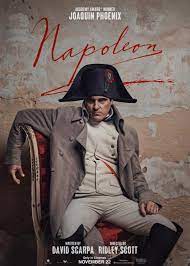As someone who views Gladiator, directed by Ridley Scott, as one of my ‘Top Ten’ movies, I had high expectations for his most recent film: Napoleon. Scott clearly specializes in historical pieces, but he has never done a biopic before. If you saw my last edition of this column, you would also see that my biopic expectations have soared following the release of Oppenheimer. I think I especially looked forward to this because it was similar to my experience with Oppenheimer, in that I had almost no previous knowledge about the person of interest. With all that said, my expectations for Napoleon were right where I thought they would be in my case. While the movie had its fair share of epic battle scenes and romantic twists, the movie felt rushed at times yet somehow still over two and a half hours long!
Let’s start out with my favorite part about this movie: the mind-blowing, eye-gripping, holding-onto-your-chair scenes that depict Napoleon in battle. There are three main ones — all which had huge effects on Napoleon’s life — which grow in importance and tension. The first is his first true battle as a commander, where he expels the British from a fort that they held in a dominating matter. The explosive sounds and fiery colors put the viewer into the battle as a spectator, and we see Napoleon’s dominating strategy play out. The second battle is my favorite, as it shows Napoleon’s personality that has developed from his now lengthy commanding career and his masterful strategy. In a battle against Russia, his French forces lure them into the camp by firing cannons. Meanwhile, Napoleon and an array of other troops wait on the hillsides of the camp’s valley. Once the Russians enter the camp expecting a quick victory, Napoleon’s troops are uncovered, rushing at the Russians from all sides while firing cannons at the battlefield. The battlefield, however, is ice meaning the cannonballs took away the ground for retreat and resulted in an awesome French victory. In my seat, I couldn’t get enough of the bloody ice water that has now formed, and the smug look on Napoleon’s face as his plan worked yet again.The third main battle is Napoleon’s defeat, which is a satisfying battle for the viewer because it was clear the end of the movie was approaching. In this, Napoleon is finally outsmarted by the combination of British and Russian troops after he rallies French troops following his return from exile (that is complicated, but worth the watch). The smug Napoleon that we have seen and learned to appreciate through the movie fades into a Napoleon who accepts defeat as soon as rain plagues his quick attacking strategy, and his reign finally comes to an end. The way the British fight here is so different from the French by forming into squares of shields; once again the movie transports you into Napoleon’s view as the master of the battlefield. I really cannot stress enough how enjoyable the battle scenes were, but only with the full context of the movie behind them. With that said, I’d encourage a watch solely for that reason.
As with every review that I have, there are always some negatives. As someone who is largely uninformed about Napoleon, I felt as if the movie jumped around too quickly, especially in the beginning. Half of his story is about his rise to power from an odd middle-class Italian-French boy, yet his entire young life is skimmed over in just a few short sentences above a black screen and the movie jumps into the first battle scene. This trend continues through Napoleon’s conquests. He goes from place to place with great battle scenes, but the exposition is clearly lacking with only words or few short scenes that left me in a state of confusion. While this could be a strategy by the director that aims the movie at those who are much more informed about Napoleon, it did not land. When I got home as I always do, I looked up reviews of the movie.
Mostly, I found critics ranting about the historical inaccuracies of the movie, missing much of Napoleon’s private life, political strategy, and formative moments for his character. The movie also ran very long. So, how did it leave so much out? The answer lies in the great battle scenes I discussed before, but because of Scott’s great emphasis on Napoleon’s strengths instead of his weaknesses, both Napoleon-nerds and Napoleon-know-nothings were left unhappy.
With this criticism, however, I think the movie can be better enjoyed with my advice: For most, who don’t know too much about Napoleon, it would be helpful to learn a bit about his background and political career, hopefully without giving too much away about his eventual end (because that is fitting, and not knowing this makes it a satisfying one in some ways). A bit of background knowledge would help to fill in the gaps that the movie can’t cover, and let you enjoy the battle scenes without questions hitting you from all angles. I strongly recommend seeing this movie anyways. My rating is a 7.8/10.


